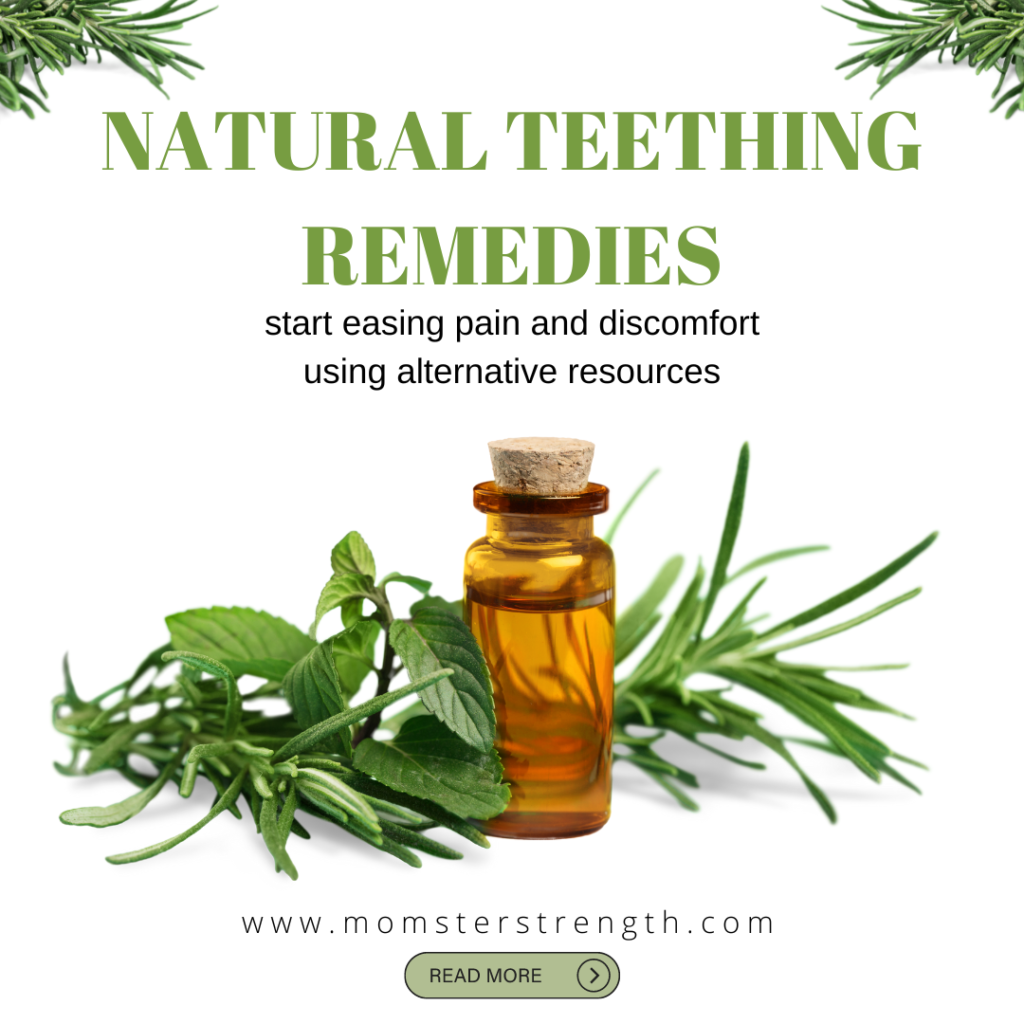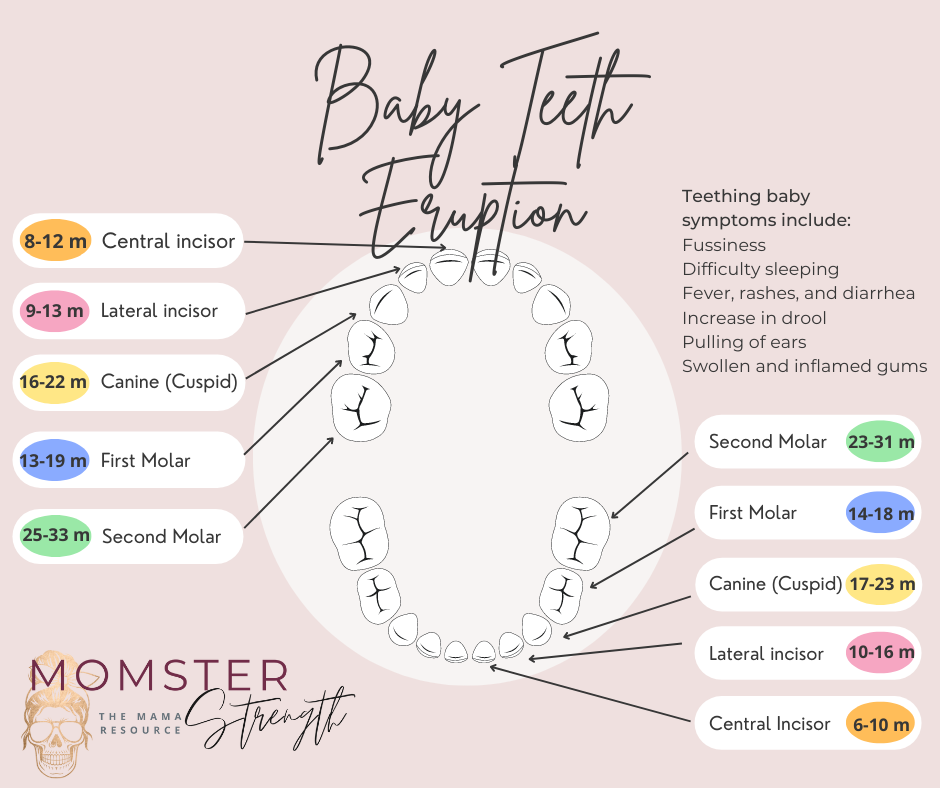7 Natural Teething Remedies: Homeopathy, Tinctures, and More
When your baby is teething, it seems like there is nothing you can do to make them feel better. They are cranky, fussy, and just don’t seem like themselves. This can be a difficult time for both parents and babies. Luckily, there are some natural remedies that can help ease the pain and discomfort of teething. In this blog post, we will discuss 7 different remedies that you can try at home!
“This post contains affiliate links, which means I receive a smallcommission, at no extra cost to you, if you make a purchase using this link. Please see my disclosure for more details.”
My experience with teething was different with each of my kids. My son didn’t get teeth until after his first birthday. He was drooling for what felt like forever. My daughter, on the other hand got her first tooth at 9 months, and basically had the next 4 teeth all come through at the same time. I remember feeling so helpless when she was going through it. I tried everything to make her feel better, but nothing seemed to work. Thankfully, we made it through that phase and she is now a happy and healthy toddler!
If you are currently dealing with a teething baby, know that you are not alone. Millions of parents go through this every year. And while it can be a tough time, there are things you can do to help ease the pain.
“I am not a medical professional and nothing on this site can be taken as medical or health advice, so check with your doctor before following any advice you find at momsterstrength.com. The information provided is based on personal experiences from myself and my readers.“
Signs of Teething
Babies begin to show signs of teething around six months old. However, some babies may start teething earlier or later than others. The first tooth usually erupts around six to seven months old, but it is not uncommon for teeth to start coming in as early as three months old or as late as twelve months old.
Common signs of teething include drooling, chewing on everything, irritability, and sleeplessness. If you suspect that your baby is teething, there are some things you can do to help them feel better.

Natural Teething Remedies
- Homeopathy is a great option for teething babies. There are many different homeopathic remedies that can be used to ease the pain and discomfort of teething. One of the most popular remedies is Chamomilla 30C. This remedy can be taken orally or applied topically to the gums. If you decide to take this remedy orally, it is important to start with a very small dose and increase as needed.
- Another homeopathic remedy that can be used for teething is Calcarea Phosphorica 30C. This remedy is often used for babies who are cutting their teeth later in life. It can be taken orally or applied topically to the gums.
- Tinctures are another great option for teething babies. Tinctures are concentrated herbal extracts that are made by soaking herbs in alcohol, vinegar, or vegetable glycerin. They are typically taken by mouth, but can also be applied to the gums. One of the most popular tinctures for teething is Teeth Tamer by Earthley. This tincture can be taken orally or applied topically to the gums.
- Amber Teething necklaces are a popular option for teething babies. These necklaces are made of amber beads that are said to have healing properties. When the amber beads are worn, they are said to help relieve the pain and discomfort of teething. If you are considering using amber teething beads, it is important to do your research. There are many different types of amber beads available, and not all of them are created equal. Make sure to purchase beads that are made of 100% Baltic Amber. These beads should also be unpolished and free of any additives.
- There are many different essential oils that can be used to ease the pain and discomfort of teething. Some of the most popular essential oils for teething are chamomile, lavender, and clove. These oils can be applied topically to the gums.
- Cold objects can help soothe teething pain. Frozen washcloths, frozen teething rings, or even frozen fruit. These objects can be given to your baby to chew on to help reduce inflammation and discomfort.
- Over-the-counter teething tablets, such as Hylands Teething Tablets or Boiron Camilia Teething Drops, are a popular option for teething babies. These tablets can be dissolved in water or taken orally. It is important to follow the package directions when giving these to your baby.
Things to Avoid When Teething
One thing to avoid is using teething gels that contain numbing agents, such as benzocaine. These agents can be very dangerous for babies and should only be used under the supervision of a healthcare professional. Side effects of these agents can include seizures, difficulty breathing, and more.

Frequently Asked Questions
What are the symptoms of teething?
- Chewing: Babies may start to chew on everything in sight when they are teething. This is because chewing helps to relieve the pressure that is build up in their gums.
- Biting: Babies may start to bite more because they are exploring their mouths with their teeth. They may also bite out of frustration or because it feels good.
- Irritability: Teething can be very painful for babies. This can lead to them being irritable and cranky.
- Drooling: Increased saliva production is common when a baby is teething. This can lead to them drooling more than usual.
- Sleeplessness: Teething pain can make it difficult for babies to fall asleep and stay asleep.
- Rashes: Teething can sometimes cause a rash around the mouth. This is due to the increased drooling that occurs when a baby is teething.
- Ear pulling: Some babies will try to relieve the pressure in their gums by pulling on their ears.
- Appetite changes: Some babies may have a decrease in appetite due to teething pain. However, it is important to make sure that your baby is still getting enough food and liquids.
- Fevers: A low-grade fever is common in babies who are teething. However, most doctors will tell you that a fever is NOT a true sign of incoming teeth.
How long does teething last?
Teething can last anywhere from a few days to a few weeks. However, some babies will experience teething symptoms off and on for several months.
My baby has a fever, should I be worried?
Most doctors will tell you that a low-grade fever is not a true sign of incoming teeth. However, if your baby has a fever that is over 102 degrees Fahrenheit, you should contact your healthcare provider.
My baby is biting everything, is this normal?
Yes, it is normal for babies to start biting when they are teething. The act of chewing helps to relieve the pressure that is build up in their gums.
What order do babies get their teeth?
The order in which babies get their teeth can vary. However, most babies will get their bottom front teeth (the incisors) first. These are followed by the top front teeth. The rest of the baby teeth typically come in over the next few years.
Do all babies get teething symptoms?
No, not all babies will experience teething symptoms. Some babies may sail through the teething process with no problems at all.

As you can see, there are a variety of options when it comes to dealing with a teething baby. Try out a few different natural teething remedies and see what works best for your child. And remember, this phase will eventually end!
If you have any questions or concerns about your child’s teething, be sure to talk to your pediatrician or a pediatric dentist.
Do you have any tips for surviving a teething child? Share them in the comments below!






